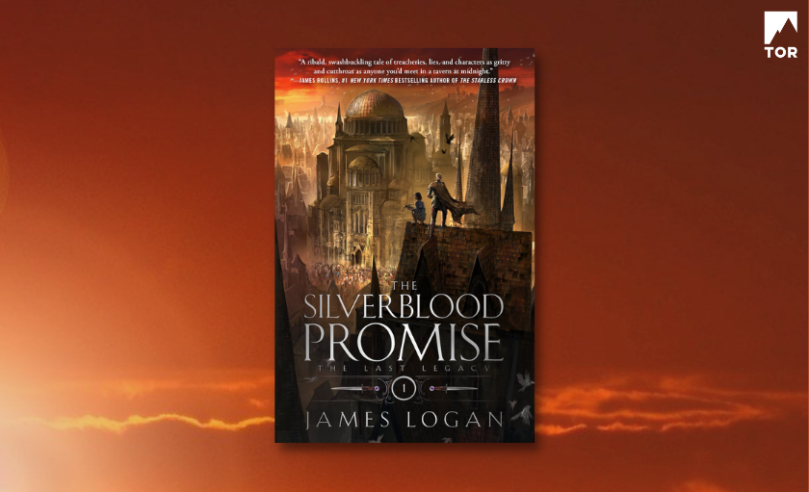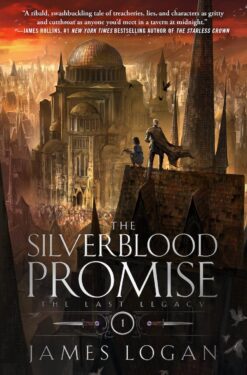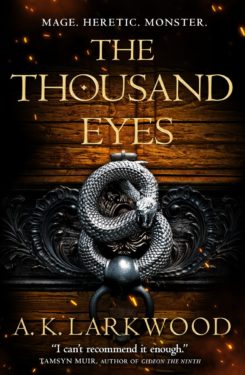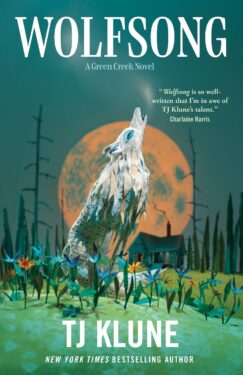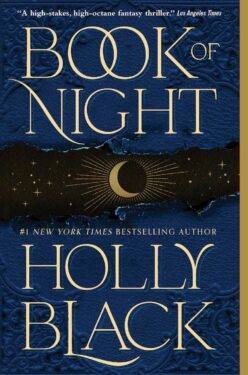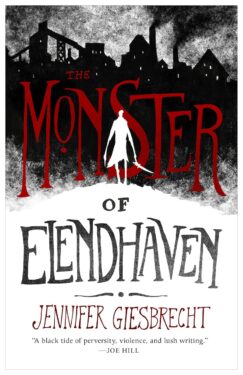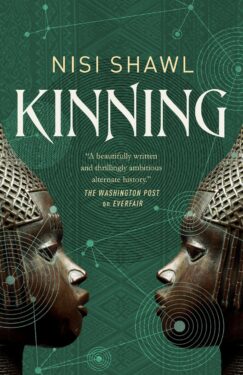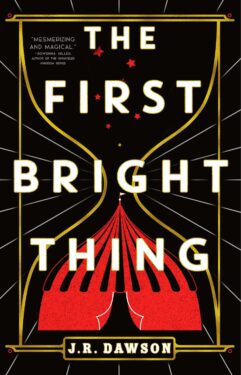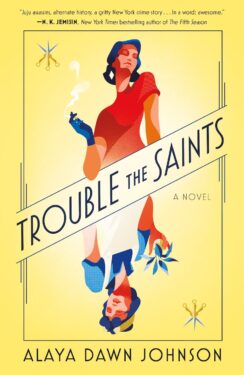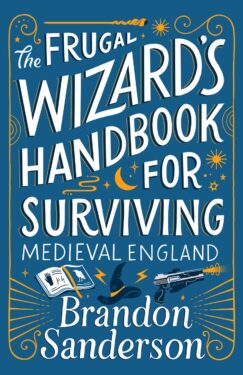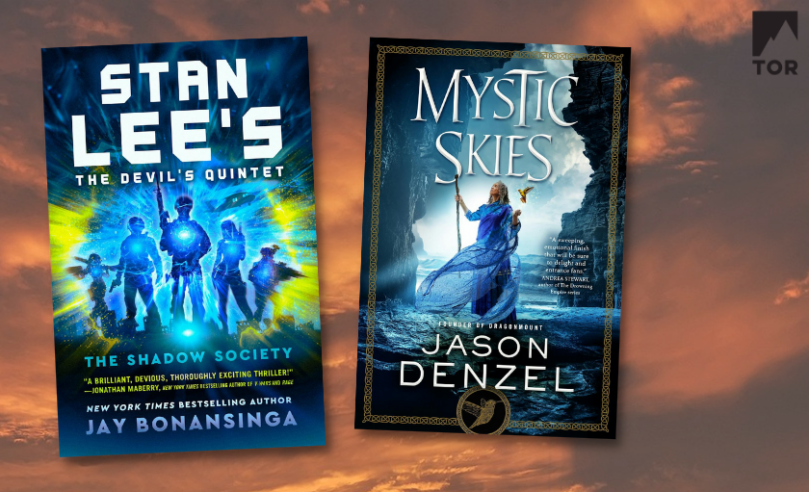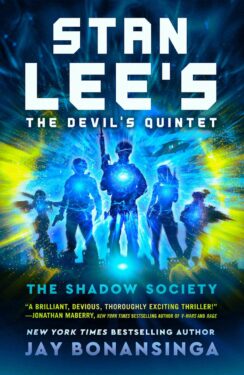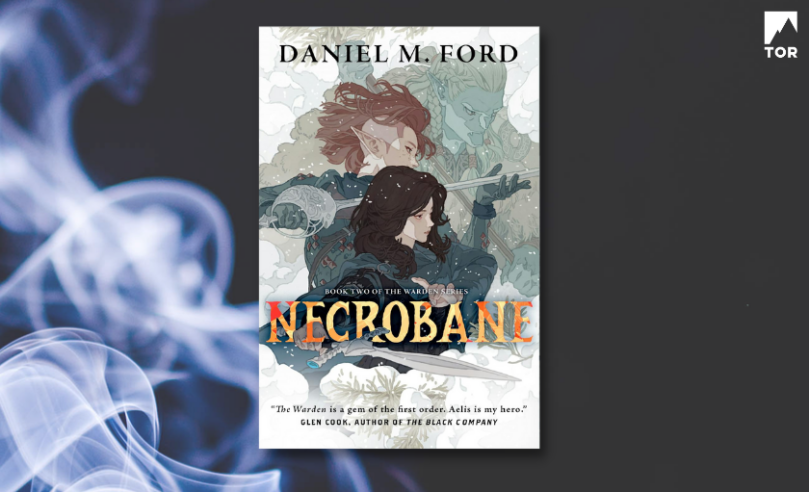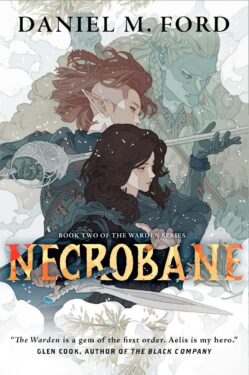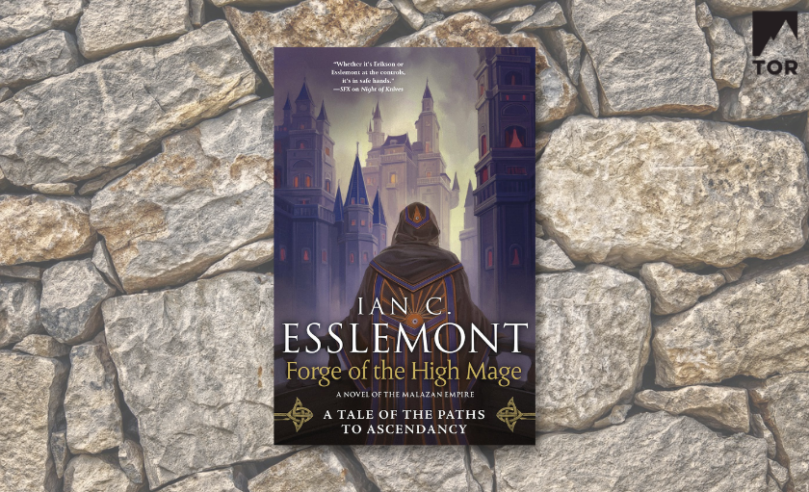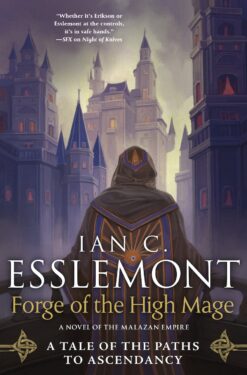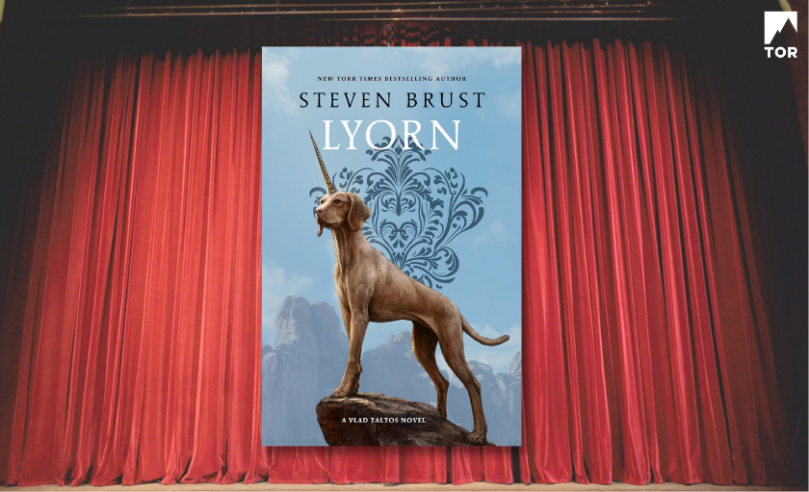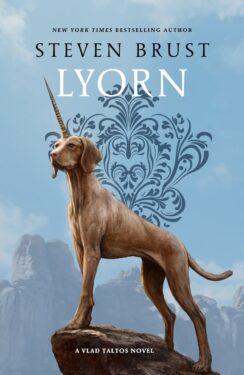Set in a city of traders and thieves, monsters and murderers, this fast-paced epic fantasy debut is a must-read for fans of Joe Abercrombie, Nicholas Eames, and Scott Lynch.
Lukan Gardova is a cardsharp, academy dropout, and—thanks to a duel that ended badly—the disgraced heir to an ancient noble house. His days consist of cheap wine, rigged card games, and wondering how he might win back the life he threw away.
When Lukan discovers that his estranged father has been murdered in strange circumstances, he finds fresh purpose. Deprived of his chance to make amends for his mistakes, he vows to unravel the mystery behind his father’s death.
His search for answers leads him to Saphrona, fabled city of merchant princes, where anything can be bought if one has the coin. Lukan only seeks the truth, but instead he finds danger and secrets in every shadow.
For in Saphrona, everything has a price—and the price of truth is the deadliest of all.
Please enjoy this free excerpt of The Silverblood Promise by James Logan, on sale 5/7/24
Chapter 1
THE LADY OF LAST CHANCES
The tavern was called the Pathfinder’s Gambit, though its patrons referred to it as “the Armpit,” or simply just “the Pit,” on account of its stale odor and the fact that its interior rarely saw sunlight. The Pit had a particular reputation for violence, and tonight had proven no exception. The evening’s current tally stood at three assaults (two stabbings and an attempted strangulation), two brawls, and—so far, at least—just the one death. Still, the night was young, the drink was flowing, and half the card games taking place in the tavern’s smoke-filled common room were rigged. It was only a matter of time before someone else took a blade between the ribs.
Could be me if I’m not careful, Lukan Gardova mused, eyeing the small pile of coins he’d won over the past half hour. The Pit’s one saving grace was that it was an excellent place to win a bit of silver, and it was for this reason that Lukan found himself sitting at a table with several companions of dubious virtue, drinking gin of dubious quality, and holding two cards of dubious value. Peasant of Crowns and a Priest of Blades, he thought, studying the faded illustrations. Bloody hells. It was a miserable hand, but that didn’t matter. In rummijake you played your opponents first and your cards second.
“I’ll raise,” the sharp-featured man to Lukan’s left finally declared, after squinting at his cards for what seemed like an eternity. “Three coppers.” He scratched at his straggly beard. “No, four coppers.” He nudged the coins toward the center of the table, only to pause and glance at his cards again. “No, wait . . .”
“You know,” Lukan said amiably, “entire wars have been fought in the time you’ve been staring at those cards.”
The man glared at him, dark eyes glinting with a base cunning that hadn’t yet manifested in his cardplay. “I’m trying to think.”
“I suspect that’s the problem.”
The man muttered an insult under his breath as he turned back to his cards. Lukan took a swallow of gin to hide his smile. He’d seen this man’s type many times before: the small-time rogue who owed too much money to the wrong people and thought that gambling would be a good way to raise the necessary funds. It might have been, had he been a good player. But he wasn’t.
“Five coppers,” the rogue grunted, pushing his coins into the growing pile at the center of the table.
Lukan studied his own cards again, just for show. The only question in his mind was by how much to raise the bet. Eight coppers should do it. Hells, may as well make it a silver—
Shouting interrupted his thoughts and he glanced toward the bar, where a familiar scene was playing out: two adventuring companies squaring up to each other, the crews trading insults while their captains exchanged glares. Steel glinted in the candlelight as blades were drawn, a hush falling across the tavern as games and conversations were abandoned. The taller of the two captains, a woman who wore a wide-brimmed hat tilted at a jaunty angle, said something that Lukan didn’t catch. Her opposite number blinked in surprise, his face—already flushed with drink—reddening even further. Then he bellowed a laugh and held out his hand, which the woman gripped in her own. Blades were returned to their sheaths as the two crews exchanged smiles instead of blows, and a cheer rose to the rafters as the red-faced captain called for a round of drinks.
Lukan wasn’t surprised by how quickly the threat of violence had faded; he’d seen this sort of scene play out a dozen times in the three weeks he’d been in Torlaine. Tensions ran high among the adventuring crews who made a living scavenging Phaeron relics from the Grey Lands, a couple of leagues to the north. This sort of behavior was Just their way of blowing off steam after surviving the dangers of that shadow-haunted landscape. For those who returned, at least.
How did it come to this? He asked himself, his gaze passing over the adventurers and opportunists who packed the tavern. How did i end up in this den of rogues at the edge of the world?
He knew the answer all too well.
Agreeing to a duel with the heir of one of the most powerful families in the old empire had been a bad mistake. But not nearly so much as winning it. Memories pressed in—a cry of rage, the flash of steel, and blood spilling across pink cherry blossoms . . .
No, he thought, forcing the images aside. Not here. Not now. Such thoughts would only spark the old anger, and then he would think of her, and—
“Who’s taking their time now?”
It was the woman sitting to his right who had spoken. Another adventurer, judging by the sword strapped to her back and the old leather armor she wore. By lukan’s reckoning she had so far made at least three bluffs and had downed twice that many shots of vodka. She sank another one now, mouth curling in what might have been amusement. The scar that split her lips made it hard to tell.
Lukan glanced at his own cards again but found that his enthusiasm for the game had faded. He almost folded his hand there and then, only for the rogue’s coins to glint seductively. Might as well see this through.
“I raise,” he said, plucking a silver coin from his pouch and dropping it onto the coppers in the center of the table. The rogue hissed through his teeth and threw down his cards even though it wasn’t his turn. The adventurer did likewise, albeit with more dignity. That just left the well-dressed stranger sitting opposite lukan, whose subtle plays had revealed him as a cut above the others. His clothes were more refined too. Dust clung to his velvet jacket, and his silken shirt was badly creased, but there was no mistaking the fine tailoring. Nor was it possible to ignore the way his emerald ring flashed when it caught the candlelight. In the gloom of the tavern, the man might have been mistaken for one of the few treasure hunters lucky enough to find their fortune out in the Grey Lands, or even one of the moneylenders who financed the adventuring companies.
Lukan knew better.
“Well, isn’t this a conundrum,” the man said with a smirk that carried more than a hint of the aristocracy. “What’s a fellow to do . . .”
“A fellow could lay down his cards.”
“Oh, I think not,” the man replied, drumming his fingers on the table. “That would be so dreadfully dull. Besides”—his ring gleamed as he gestured at the pile of coins—“there’s too much of my money in there for me to walk away.”
Too much of your family’s money, you mean. Lukan could see the man for who he was: a child of privilege, a spoiled dandy, who had taken it upon himself to gamble away a sliver of his family’s fortune. And why not, Lukan thought, his gaze flitting to the two heavyset men watching from a nearby table, when you can just have your hired muscle retrieve it for you afterward. They were the only reason the dandy wasn’t lying dead in a gutter, his corpse stripped of valuables. What he was even doing in Torlaine Lukan could only guess. Perhaps he was intending to take a short trip into the Grey Lands and poke around some of the ruins, or try to catch a glimpse of a gloomfiend. Something to boast about to his friends over a brandy or two in the smoking rooms of Amberlé, or Seldarine, or wherever the hells he was from. Well, whatever his plans are, I’ll ensure his purse is that little bit lighter.
“What say we liven things up a little?” the dandy said, producing a gold ducat and sliding it into the middle of the table with deliberate slowness. Lukan heard the rogue’s sharp intake of breath to his left; no doubt that coin alone was more than enough to pay off his debts. Its value far exceeded the assembled pile of copper and silver. Which makes it more trouble than it’s worth. Lukan made to toss his cards away, only to pause as the dandy reached for his glass of wine.
A flash of white.
Well, well. That changes things. Lukan considered his options. He could still back out and walk away, but what he’d just seen now made that option harder to bear. Sometimes you owed it to yourself to do what was necessary, not what was easy.
Especially when some arsehole was cheating you at cards.
“So what’s it to be?” the dandy asked, smirking as he toyed with his ring.
Lukan laid his cards down on the table.
“Pity,” the man said, reaching out to gather his winnings. “I was hoping the two of us might go another round—”
“The three of us, you mean.”
The dandy hesitated, hand outstretched. “I beg your pardon?”
“The three of us,” Lukan repeated. “You, me and the Lady of Last Chances you’ve got tucked up your right sleeve.”
The words hung in the air between them.
“You dare accuse me?” the dandy said, with an edge to his voice that might have sounded threatening if used by someone else. “Do you have any idea who I am?”
“A dead man if you’ve cheated us,” the adventurer replied.
“Enough!” the dandy snapped, rising from his chair. “I don’t answer to gutter scum like you—” He gasped as the rogue hauled him back down. “Get off me, you filth—” He fell silent as the man pressed a dagger against his throat.
“You don’t have to answer to them,” the rogue said, nodding at Lukan and the adventurer, “but you’ll damned well answer to me.”
He’s not much of a cardplayer, Lukan thought, but he knows how to handle a blade. And make a threat.
As the dandy squealed for help, his guards decided they should probably intervene—after all, neither of them was going to get paid if their employer was busy choking on his own blood. They rose from their table, hands reaching for their weapons.
“One more step and I’ll open his throat,” the rogue announced, the cold gleam in his eyes more convincing than any bluff he’d made at cards.
“Do as he says,” the dandy squeaked.
The two guards traded glances and remained still.
“Now,” the rogue said to the dandy, “let’s see about this lady friend of yours, shall we?” He nodded at the adventurer, who slid her fingers under the man’s lacy cuff and withdrew a dog-eared card that bore a depiction of a woman with her arms spread wide, a wry smile on her lips.
“Well, would you look at that,” the rogue said, applying more pressure with his blade.
“P-please,” the dandy stuttered, his earlier bravado leaking out of him along with the blood now trickling down his neck. “I-I can explain—”
“Not without a tongue you can’t,” the rogue snarled. He rose to his feet, dragging the dandy up with him, and glanced around the tavern, clearly sensing the opportunity to make a statement. “No one crosses Galthan Adris and lives,” he said loudly, drawing nothing more than a handful of stares and a snigger.
“Idiot,” the adventurer muttered.
“The hells did you say?” the rogue demanded, clearly ruffled that his grand announcement hadn’t had the effect he’d desired. Sensing that his captor’s attention was elsewhere, the dandy chose that moment to try to struggle free.
“Stay still, you dog,” the rogue hissed, a rather unfair request to put to someone whose tongue you’d threatened to remove. As the two men struggled, the rogue’s foot slipped in a puddle of stale beer, and he fell, dragging his opponent down with him. A ragged cheer rose from the handful of patrons who had been watching the little drama unfold, causing others to turn and stare.
“A fight!” someone shouted, quite unnecessarily, and suddenly everyone in the tavern was crowding around the two figures flailing at each other on the floor. The dandy’s two guards strode over to the struggling pair and tried to separate them, while the crowd shouted insults. Someone hurled a bowl of soup, which struck one of the guards on the shoulder and exploded all over the side of his face. The guard spun round, eyes blazing as he wiped the crowd’s laughter quieted as the guard drew his sword.
Time to get out of here.
Lukan opened his money pouch and swept the pile of coins— including the dandy’s gold ducat—inside. As he pulled the drawstrings he caught the adventurer looking at him, one eyebrow raised. “I won the hand,” Lukan said. “The pot’s mine.”
“You folded.”
“So did you.”
“He cheated us both.”
True enough. Lukan dug a silver coin out of his pouch and flicked it to the adventurer. “If we’re being fair,” he said, “we ought to give our friend down there his share.”
“I don’t think he’s in a position to accept it,” the adventurer replied, pocketing the coin. “Do you?”
“No,” Lukan replied, watching as the rogue snarled in his frustrated attempts at opening the dandy’s throat. “I don’t think he is.” While the soup-drenched guard continued to bellow at the increasingly unruly crowd, his comrade was trying his best to stop their young charge from meeting a messy end on the tavern floor. He grabbed hold of the rogue’s jerkin, only to lose his footing and fall back against a table, spilling beer everywhere.
Another cheer rose to the rafters.
“Good luck,” the mercenary said, lips curling in what might have been a smile.
“You too.”
With those words Lukan slipped through the crowd and out of the tavern.
Copyright © 2024 from James Logan
Pre-order The Silverblood Promise Here:

